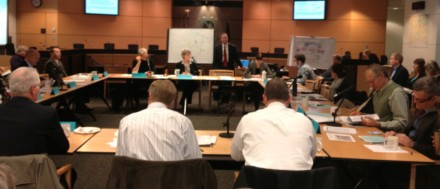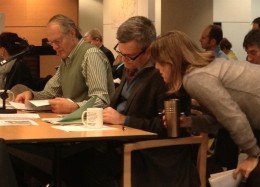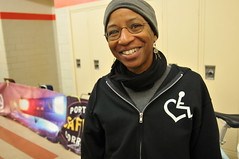
(Photo © J. Maus)
A Metro committee unanimously approved a $70.7 million package of federal “regional flexible funding” at a meeting of their Joint Policy Advisory Committee on Transportation (JPACT) this morning. 14 projects (totaling $22.9 million) — including $2.0 million for the Portland Bike Sharing Project — were included in the passed resolution.
But prior to the vote, there was a heated exchange between Mayor Sam Adams and Multnomah County Commissioner Deborah Kafoury. It came after two citizens gave testimony to the committee about concerns that equity considerations and public input around the bike sharing project has been inadequate. Kafoury supported the concerns and tried to delay a vote on the project, while Adams spoke up in its defense.
“Basically, we’re being asked to deal with the equity stuff later; that’s not a good approach from our perspective.”
— Alan Hipolito, citizen
In a move that JPACT Chair and Metro Commissioner Carlotta Collette said was not their “usual operating mode” she allowed two members of the public to make a public comment prior to the vote. (Members of JPACT were told of this procedural change only upon getting to the meeting and ODOT Region 1 Manager Jason Tell expressed concerns about that later in the meeting.)
The two people who testified were: Alan Hipolito, representing the Native American Youth Center, the Urban League of Portland, and others; and Carla Danley, a citizen activist who also sits on the City of Portland Bicycle Advisory Committee.
Hipolito said he opposes the bike share proposal as currently designed, saying that while it goes into high detail with data and traffic analysis, it “proposes to address equity concerns later.” Hipolito added that, “This is a clear recipe for failure. Equity commitments must be included from the beginning at the level of detail and action commensurate with its other commitments and they must be required prior to the vote on flexible funds.”
“Basically, we’re being asked to deal with the equity stuff later; that’s not a good approach from our perspective.”
Hipolito requested that a set of conditions, what he called an “equity agreement”, be agreed to before any further action takes place on the project.
One of the key issues of concern for Hipolito and others is that the bike share program will only benefit downtown Portland, and not outlying neighborhoods (this isn’t the first time we’ve heard opposition to this project on those grounds). There has been some talk of extending the rental kiosks and stations into neighborhoods, but so far no commitments have been made.
Carla Danley agreed with Hipolito. She has opposed the bike share project on equity concerns in the past. Back in August we reported that she called it a “Central City perk” and said that the project would be a “PR nightmare for PBOT” if it went forward because it fails to address the needs of “long-neglected neighborhoods.”
At JPACT this morning, Danley said, “There appears to be a habitual pattern of flawed process and lack of meaningful public process from PBOT.” Danley then brought up the N. Williams project as an example of where PBOT brought the community a “fairly developed project that they were ready to move ahead on and the community felt there hadn’t been appropriate process.”
“I think we’re seeing a pattern around the city,” continued Danley, “of communities really feeling as though they don’t have meaningful public input in regards to transportation projects.”

After that testimony, Multnomah County Commissioner Deborah Kafoury spoke up in support of Danley and Hipolito.
“I am somewhat bothered by the concerns that have been raised by the community of equity,” Kafoury said, “equity is one of our priorities and commitments as we fund transportation projects and we have the opportunity right now to walk that talk.”
Kafoury then put forth a motion to postpone the vote on the entire resolution until next month in order to “allow the City of Pprtland and the community of equity to come together and work out some language that is beneficial for both.”
After Metro staff advised that it would be better to pull out just the bike project from the rest of the projects in the resolution, Mayor Sam Adams responded to Kafoury’s motion.

from his transportation policy
director Catherine Ciarlo at the
meeting this morning.
(Photo © J. Maus)
“Commissioner,” Adams said, directly to Kafoury, “I have to say that’s pretty gutsy on your part, because your projects went through much less equity review than this project.”
Adams continued:
“The fact that this project is controversial is that projects of this nature are controversial before they’re implemented, much like other transportation innovations — whether that be streetcar or light rail or bikes in general… When we’ve done them the first time, locally or nationally, they’re controversial. On this particular project, you’ve got downtown that’s 52 times above the DEQ ambient requirement for air quality. Some of the most poor and diverse census tracts in central Portalnd.
I have to say that’s kind of gutsy. I understand folks don’t like this project. Fair enough. We agree to disagree.
This is, in addition to serving cent Portland, this serves PSU and will give free and affordable ways for people to get around that don’t have opportunity to take their bike from other parts of the region as they attend college. It gives people who are low-income to have the ability to move around on bikes downtown that right now they don’t have the financial ability to do.
I understand that people don’t like this… I don’t mind the high standards in terms of equity and I understand that in this particular proposal that equity might not be readily apparent; but I think that’s a misunderstanding of what this proposal does for racial, geographic, and class equity and I’m happy to run all your projects through the equity filter that you have not done.”
Kafoury then amended her motion to separate out the bike share project from the other projects and programs on the list. She then responded to Adams:
“I think it’s a complete misrepresentation of my position to assume I am opposed to this project. I think we have the opportunity to make this project a national model by addressing one particular aspect. I’m sorry that you [Mayor Adams] think that I’m opposed to the project.”
Mayor Adams:
“Are you willing to take your projects through [an equity filter]? Because your projects on the list here don’t have the same high expectations around equity.”
Commissioner Kafoury:
“I’d rather not get into an argument here; but if the community that has come forward and has addressed these concerns would like to say that our projects are equally flawed, then… But I haven’t heard those comments. In addition, it was my understanding that the community of equity came to PBOT with their concerns and were told they’d be addressed and they weren’t…”
Mayor Adams:
“This project doesn’t even have an RFP yet. Our record at PBOT — as evidenced by the allocation of resources you’re voting on today — where half of them, over half if you take out freight, is going to east Portland, that is evidence. It is very disingenuous for you to try to portray otherwise when the RFP isn’t even written because we don’t have the funds for it.
So, our ability to address this further remains ahead and I’m happy to submit a motion if you want on bike sharing that we’ll continue to meet with environmental justice folks and try to work out something… But the folks that don’t want this to happen at all, I’m not going to satisfy them if this moves forward.
I have to point out to Allan and you (Carla Danley); I would like to see if the rest of the proposals, this is a $23 million expenditure, and one item is being pulled out by you and others for a criticism… If you want to talk equity, let’s talk equity. This is $2 million out of $23 million, we can talk equity on every single one of these projects and at the last minute to try and pull out one is just, unfortunate.”
I recorded the meeting and have uploaded the six minute exchange, which you can listen to below:
[audio:jpact_RFF_bikeshare1.mp3|titles=JPACT exchange on bike share project and equity between Adams and Kafoury]
After that defense of the project by Mayor Adams, JPACT Chair Carlotta Collette asked if anyone would second Commissioner Kafoury’s motion. No one responded. The original resolution then passed unanimously.
After the meeting, I spoke with one of bike sharing’s most ardent supporters, BTA Advocacy Director Gerik Kransky. He acknowledged that there were “bumps in the road” in terms of getting the equity piece right in this process, and added that, “the most important thing we can do is build equity in at the beginning” of the funding allocation process. “We tried to do that with the process this time. Staff at Metro struggled with the issue. Task forces worked to get it right.” But, Kransky added, “It’s clear we’ve got more work to do when we have partners from the community saying their concerns aren’t getting addressed.”
With today’s vote PBOT can now draft a request for proposals to hammer out the project details and find a bike share system vendor. For more background on the bike-sharing project, see our past coverage.
I’ll post a separate story with details about the flexible funding process and other projects that were included in today’s resolution.


